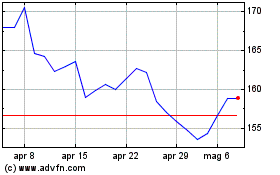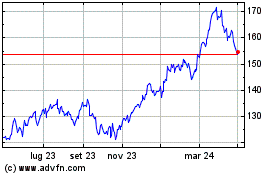Satellite Venture's Benefits Touted -- WSJ
18 Luglio 2018 - 9:02AM
Dow Jones News
By Andy Pasztor
This article is being republished as part of our daily
reproduction of WSJ.com articles that also appeared in the U.S.
print edition of The Wall Street Journal (July 18, 2018).
FARNBOROUGH, London -- The head of Airbus SE's defense and space
business anticipates major long-term benefits, including possibly
Pentagon contracts, as a result of implementing a high-volume
automated production system for small satellites.
Dirk Hoke said the production and quality-control changes --
under way as part of a joint venture with Internet services
provider OneWeb -- will position Airbus to churn out less-expensive
spacecraft using fewer workers and less testing than with
traditional factory practices.
Airbus officials previously highlighted expected financial gains
stemming from assembling up to two satellites a day at the
comparatively low cost of $1 million each. But Mr. Hoke's comments
at the international air show here Monday were the most specific
yet about the project's positive effect on internal industrial
processes, as well as on the general approach of Airbus
engineers.
Committing to assemble a new generation of lightweight
satellites primarily using robots "was a game-changer for us," Mr.
Hoke said. Previously the Airbus unit assembled one or two much
larger satellites a month relying heavily on manual labor and
extensive testing during production.
The satellites slated to be built for OneWeb on a Florida
assembly line later this year will undergo substantially less
testing as a unit, once individual components meet requirements
earlier in the process.
Nicolas Chamussy, who runs the Airbus satellite business, said
in the same interview that the impact on engineers has been
significant. "It has brought the teams to the spirit of we can
probably do things differently" than in the past, he said.
Now, Airbus is working on ways to transfer the knowledge and
lessons learned beyond the several hundred Airbus staff working on
the project.
In addition to staff training and awareness, Mr. Hoke said the
production changes will help Airbus maintain what he described as a
"one, two or three year" head start over competitors seeking to
launch small-satellite constellations similar to those designed for
OneWeb and its initial deployment of 900 spacecraft..
The scale of OneWeb production has tested Airbus, the officials
said. The company, for instance, needs to install one onboard
computer on each satellite. In the past, Airbus has produced
roughly one such computer per month.
The upshot is that Airbus experts designed the computers, which
were then contracted out to suppliers.
Mr. Hoke said prospective customers interested in
small-satellite projects tend to "like the design" of the basic
satellite platform employed for the OneWeb constellation and
"active discussions" are under way with other customers on
potential follow-on systems. Airbus also is mulling whether to use
the same platform to bid on a closely watched Pentagon research
project called "Blackjack," consisting of small satellites.
Write to Andy Pasztor at andy.pasztor@wsj.com
(END) Dow Jones Newswires
July 18, 2018 02:47 ET (06:47 GMT)
Copyright (c) 2018 Dow Jones & Company, Inc.
Grafico Azioni Airbus (EU:AIR)
Storico
Da Mar 2024 a Apr 2024

Grafico Azioni Airbus (EU:AIR)
Storico
Da Apr 2023 a Apr 2024
